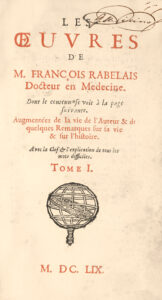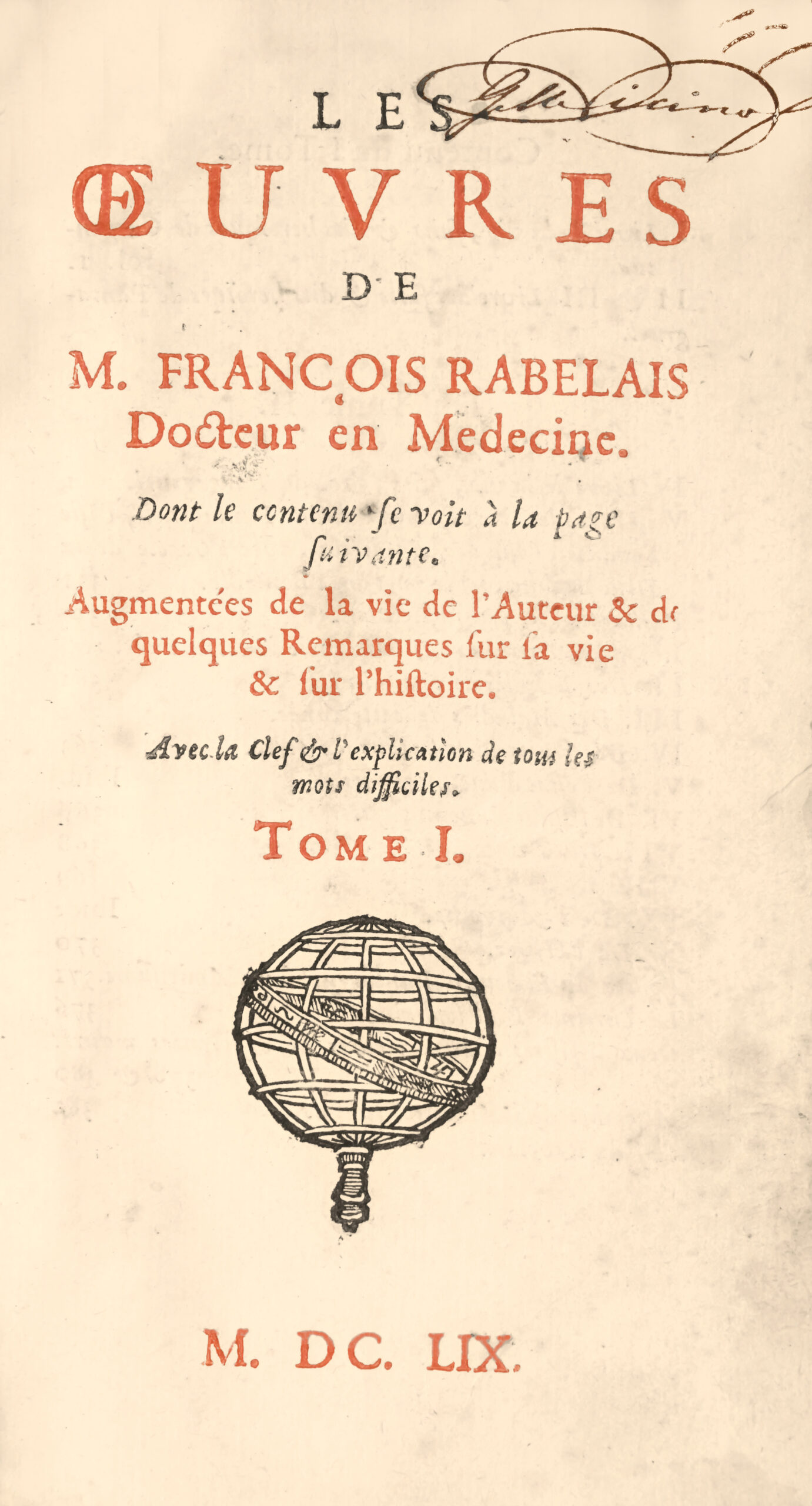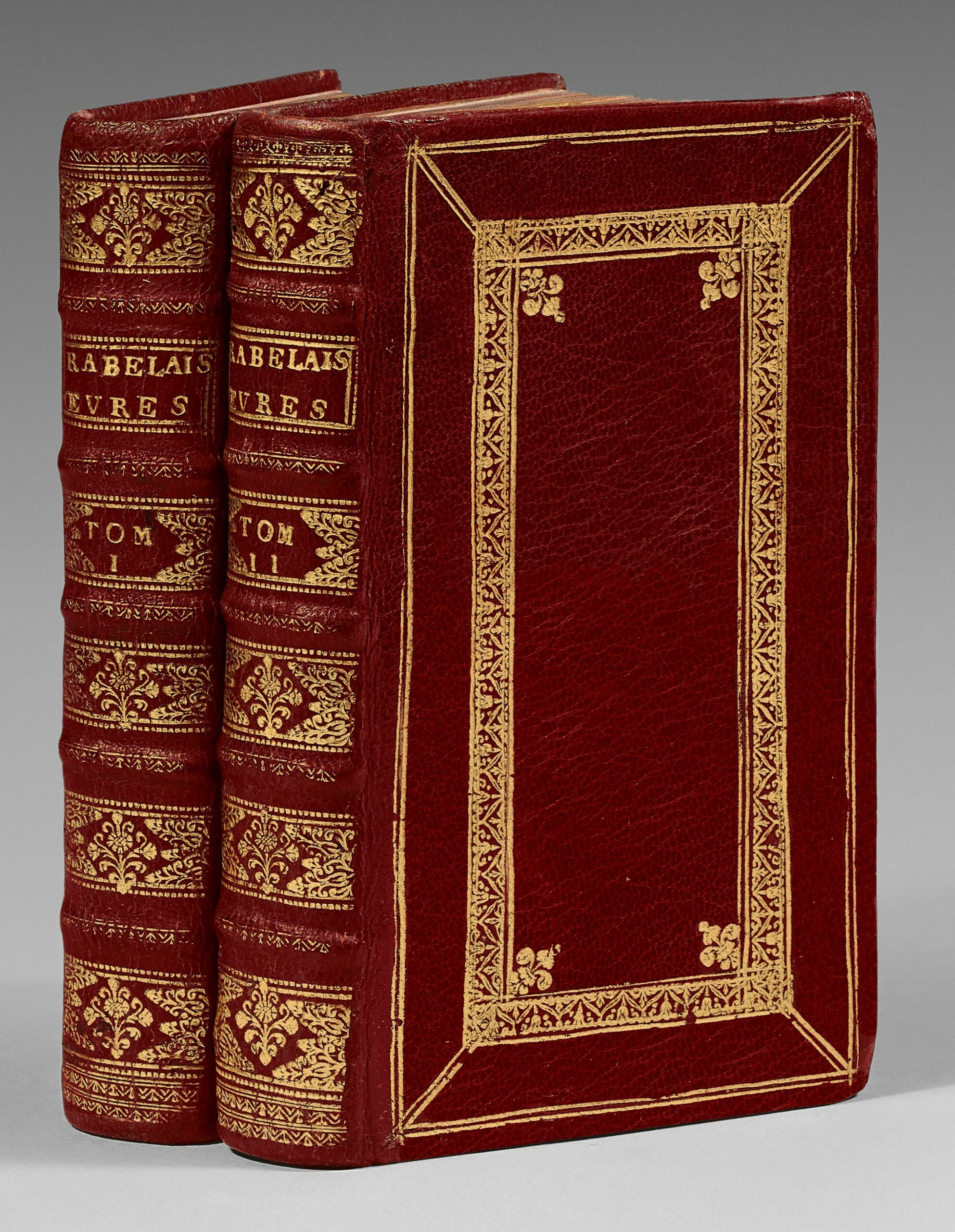Les Œuvres de M. François Rabelais Docteur en Médecine. Dont le contenu se voit à la page suivante. Augmentées de la vie de l’Auteur & de quelques Remarques sur sa vie et sur l’histoire. Avec la Clef & l’explication de tous les mots difficiles. Volume I.
M.DC.LIX (1659). The half title, in black, bears: Rabelais M.DC.LXIX (1669).
The title of the first volume is printed in red & black.
That of the second, in black, bears only these lines: Les Œuvres de M. François Rabelais, Docteur en Médecine. Tome II. M.DC.LXIX (1669).
2 volumes large 12mo : I/ (12) ll., 490 pp. wrongly numbered 488, (5) ll. ; II/ 459 pp., (9) pp., 1 figure p. 347, few marginal waterstain.
Full red morocco, covers decorated with a frame “ à la Duseuil”, decorated spine ribbed, gilt inner border. Contemporary binding.
157 x 87 mm.
Precious edition of the works of François Rabelais published in the 17th century.
“Nice edition printed with Elsévirian characters, but which we believe came from the presses of a printer in Brussels. It is certainly a copy of that of 1663, of which it reproduces the text page for page and almost always line for line. Due to a typographical error, the frontispiece of the first volume bears the date M.D.LIX, while that of the second volume reads the date M.D.LXIX, which must be the true one, since there are copies in which the error has been corrected; and of which the two titles are from 1669. – The first volume has 12 preliminaries ll., 488 pp. and 5 ll. for the table. Pages 215 and 216 are repeated as in the 1663 edition. The second volume contains 459 pp., the table occupies 7 pp., and the Clef du Rabelais, which is not found in the 1663 edition, nor in the reprints which were made in 1666, in 1675 and in 1691, is contained in 2 pp. » (Brunet, IV, 1059).
“In the Bulletin du bibliophile of June-July 1851, Mr. J. Chenu published a note on this edition, which he believes was really printed by the Elzévirs. A simple inspection of the sphere printed on the titles demonstrates the impossibility of this hypothesis. The edition – highly elegant furthermore, from the typographical point of view as well as from the quality of paper – seems to us to have been printed in Rouen.
It was itself forged several times, probably in Brussels. We have before us three different imitations (with the date 1659 on both volumes), badly printed on poor paper. There are others, with the same date, & the indication: A Bruxelles, chez Henri Frix, vis-à-vis la Madeleine, & Amsterdam, Adrien Moetians, à la Librairie Française; still others, bearing the dates 1721, 1724 & 1734, in Brussels, chez Nicolas Langlois, proche la Madeleine.” (P. P. Plan, Bibliographie rabelaisienne).
In all his works, man must make himself a co-operator with God. This morality of effort and confidence in God’s grace is opposed to Calvin’s doctrine of predestination, which Rabelais condemns, and to the atheism that the positivists of the turn of the century, frightened by the jokes about religion, despite the monastic tradition, wanted to see in Rabelais.
Beyond this quest for oneself, this propaedeutic of knowledge symbolised by the journey of the Fourth Book, the work of Rabelais is also a violent denunciation of all social vices, a satire of conformism: criticism of monks, pilgrimages, confession, the worship of saints following Erasmus; criticism of the vices of the papacy in the episode of the Papimanes or the Isle Sonante; criticism of the sorbonnards of the sophists; of justice. It is also a practical treatise on pedagogy, a veritable institution of the prince, a social utopia with the harmony of the Thelemists.
An attractive copy finely bound in contemporary red morocco, one of the rarest conditions for early editions of Rabelais.
See less information



